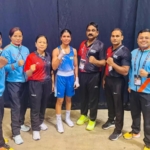Zimbabwe all-rounder Sikandar Raza has set a new record by surpassing Virat Kohli‘s achievement for the most Player of the Match (POTM) awards in T20 internationals. The Zimbabwe all-rounder accomplished this feat during the second T20I against Sri Lanka in Harare on September 6.Raza’s outstanding performance included taking 3 wickets for 11 runs in four overs, contributing significantly to Zimbabwe’s five-wicket victory. His bowling helped restrict Sri Lanka to just 80 runs in 17.4 overs.
The 39-year-old Zimbabwean’s latest award marks his 17th POTM in T20Is, placing him at the top among players from full-member nations. This achievement surpasses Virat Kohli’s record of 16 POTM awards in 125 T20Is played between 2010 and 2024.Go Beyond The Boundary with our YouTube channel. SUBSCRIBE NOW!India’s current T20I captain Suryakumar Yadav has also earned 16 POTM awards in his 83 T20I appearances. In the overall T20I rankings, Malaysia’s Virandeep Singh leads with 22 POTM awards in 102 matches.Brad Evans supported Raza’s performance with three wickets for 15 runs in 2.4 overs. Blessing Muzarabani also contributed by dismissing two Sri Lankan batters.Sri Lanka’s total of 80 runs stands as their second-lowest score in T20 internationals. Their lowest scores include 77 against South Africa in New York, 82 against India in Visakhapatnam, and two instances of 87 runs against Australia in Bridgetown and India in Cuttack.Kamil Mishara scored 20 runs from 20 balls batting at number three for Sri Lanka. Captain Charith Asalanka contributed 18 runs from 23 balls at number five, while former captain Dasun Shanaka made 15 runs from 21 balls.In Sri Lanka’s bowling effort, Dushmantha Chameera claimed 3 wickets for 19 runs in four overs. Binura Fernando and Maheesh Theekshana each took one wicket.The updated list of most POTM awards in T20Is now stands with Virandeep Singh (Malaysia) at 22, Sikandar Raza (Zimbabwe) at 17, Virat Kohli (India) and Suryakumar Yadav (India) at 16 each, and Mohammad Nabi (Afghanistan) and Rohit Sharma (India) at 14 each.













